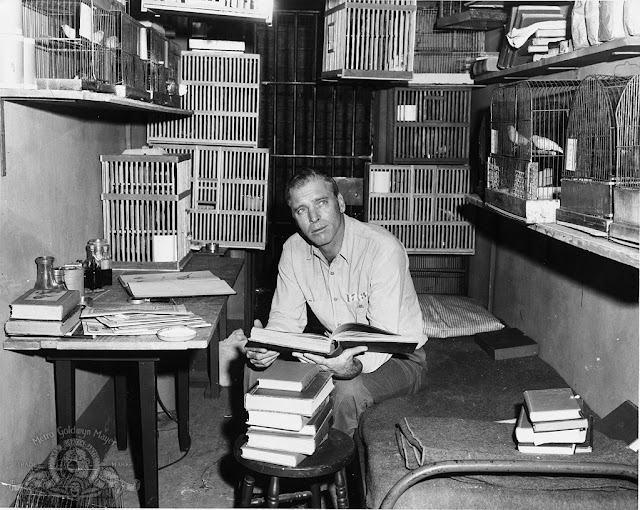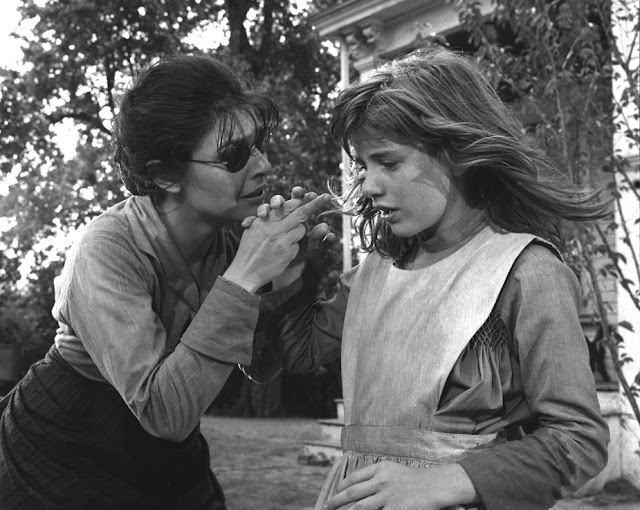In 1955, Thomas E. Gaddis, a prison consultant, psychologist and writer, profiled the remarkable story of prisoner Robert Stroud in his book Birdman of Alcatraz. A few years after its publication, 20th Century Fox was interested in adapting the biography into a movie. They received pressure by the Federal Beureau of Prisons to abandon the project which they eventually did. It took Burt Lancaster, an actor with the resources and the gumption to make things happen to bring Stroud’s story to the silver screen.
What made Robert Stroud’s story so captivating? Imprisoned for murder, Stroud spent 54 years of his life behind bars, and 42 of those was in solitary confinement. He rebelled against the prison system, killing a prison guard when he was denied a family visit and writing two books which cast doubt on how prisons were being managed. Stroud became famous for his work studying birds earning his name as the Birdman of Alcatraz. He rehabilitated and kept sparrows and canaries and developed medicine to cure a particularly stubborn disease that was killing his canaries en masse. His study contributed to the study of avian pathology in a big way.
With Stroud, Lancaster had an agenda. He admired Stroud’s resilience and said "Stroud will not kowtow. He will not make polite amends for what he has done." According to Lancaster biographer Kate Buford, "[Lancaster] hoped [his film] would galvanize the audience... and came to believe the movie would be the vehicle to free the prisoner."
 |
| Karl Malden, Neville Brand and Burt Lancaster in Birdman of Alcatraz |
Birdman of Alcatraz (1962) stars Burt Lancaster as Robert Stroud, a pimp accused of killing a man who beat up one of his prostitutes. He’s sent to Leavenworth Penitentiary and is under the supervision of prison guard Bull Ransom (Neville Brand). The prison warden Harvey Shoemaker (Karl Malden) is a strictly-by-the-book kind of guy. He believes he can rehabilitated even the worst criminal if they follow his rules. Stroud presents a challenge to Shoemaker’s way of thinking. When Stroud is denied a visit by his mother (Thelma Ritter), he kills one of the prison officials. His mother petitions on his behalf, saving him from execution but he must pay the price of his crime with life imprisonment in solitary confinement. We follow his story throughout the decades as he befriends fellow inmate Feto Gomez (Telly Savalas) and as he helps save and raise an abandoned sparrow. Stroud develops a keen interest in birds and uses not only his smarts but also prison regulation loopholes to raise the canaries in his cell. He becomes famous on the outside for his study on the diseases affecting canaries and befriends an aviary enthusiast Stella (Betty Field). The two create a business together and marry so that they can continue their work. We follow Stroud’s story until he his transferred to Alcatraz, lives through the famous prison riot, eventually leaves the island, meets with his biographer Gaddis (Edmond O’Brien) and is transferred to another facility.
There are no spoilers here because the timeline follows closely the events in the real Stroud’s life. However, Lancaster’s Robert Stroud is essentially different from the real man and many elements of the story are fictionalized. While Lancaster had high hopes that the movie would make an impact and help Stroud finally get parole, it ultimately didn’t. The biggest impediment was Stroud's notorious reputation. He was far more violent than the movie depicted and the Federal Bureau of Prisons classified him as a “violent homosexual.” Stroud died the year after the film’s release and never got to see Lancaster’s portrayal of his life.
 |
| Burt Lancaster in Birdman of Alcatraz |
Birdman came after a string of notable films for Lancaster including Elmer Gantry (1960), The Young Savages (1961) and Judgement at Nuremberg (1961). Producer Harold Hecht and Lancaster revived their production company Norma to make Birdman. Initially Charles Crichton was on board as director but it quickly became apparent that this was not the project for him. Hot-tempered Lancaster clashed with Crichton and he was swiftly removed. Although Lancaster had also butted heads with John Frankenheimer on the set of The Young Savages, Lancaster admired his work and he was hired for Birdman. The Federal Bureau of Prisons was uncooperative so filming at actual locations was out of the question. Some exteriors were filmed in San Francisco and you can see Alcatraz in the background. The rest of the film was shot on the Columbia Studio lot. Lancaster spent weeks working with sparrows and canaries to prepare for the part. Unfortunately, as is the case with many early films featuring animals, birds were harmed (and killed) in the making of this movie.
This was my first time watching Birdman and I was quite taken with this marvelous movie. It’s long, clocking in at 2 hours and 28 minutes, but it never feels like it outstays its welcome. The audience is given time to live in Stroud’s world and to get to know him and the circumstances he’s living in. Nothing ever feels rushed as is the case with many biopics. I quite enjoyed Lancaster’s more muted performance as the quiet but rebellious Stroud. This film features many of my favorite actors including Karl Malden, Telly Savalas, Neville Brand, Edmond O’Brien and Thelma Ritter. I wish O’Brien had more to do. He’s only in two quick scenes at the very beginning and end.
There are several scenes scenes that really stood out for me in Birdman.
Opening scene – Stroud (Lancaster) and several other criminals, supervised by prison guard Bull Ransom (Neville Brand). Everyone is sweating profusely from the heat. Lancaster removes his prison cap, places his hands inside to protect them and shatters the glass with his fists letting some much needed air in. This is Stroud’s first act of defiance and sets up his character beautifully.
Feto Gomez at Alcatraz – During their time at Leavenworth, Stroud and Gomez (Telly Savalas) become friends. They are reunited at Alcatraz where Stroud is a new prisoner. Gomez has worked up the ranks, gaining the trust of officials and is now responsible for serving the prisoners their meals. The two have a wonderful moment reminiscing about the past and Gomez generously gives Stroud second helpings of food. Stroud asks Gomez how many years he’s been behind bars. As Gomez works through the math we realize why Stroud asked him this and the impact of spending so much of their lives imprisoned.
Prison guard says goodbye to Stroud – Ransom (Brand) and Stroud (Lancaster) were on opposite ends of the prison system and Ransom was always quick to have the upper hand. But after more than a decade together at Leavenworth, Ransom begins to feel a friendly affection for Stroud. He watches him progress in his study of birds. When the two part ways as Stroud is transferred to Alcatraz, Ransom’s eyes wells up with tears, they shake hands and part ways. This is a brilliantly nuanced performance by Brand who adeptly shows tenderness in a pivotal scene.
Rehabilitation Argument – This is by far my favorite scene int he movie. Warden Shoemaker (Malden) and Stroud (Lancaster) never see eye-to-eye. And it’s never more clear than in this moment in the film. Stroud has just written a manuscript criticizing the prison system and Shoemaker blocks it’s publication. Malden’s Shoemaker delivers a speech about his frustration with Stroud for resisting his efforts for rehabilitation. Lancaster’s Stroud comes back with a powerful rebuttal. He presents Shoemaker with the etymology of “rehabilitation” which means to restore someone to their former condition with dignity. It’s a powerful political statement for prison reform if I ever heard one.
In 1963, Birdman was nominated for four Academy Awards including Best Actor (Lancaster), Best Supporting Actor (Telly Savalas), Best Supporting Actress (Thelma Ritter) and Best Cinematography - Black and White (Burnett Guffey). This was Lancaster's third Academy Award nominated performance and he and Frankenheimer worked on a total of five films together.
Birdman of Alcatraz (1962) is available on Blu-Ray and DVD from Olive Films. The discs feature film commentary from Lancaster biographer Kate Buford. My Blu-Ray disc unfortunately was faulty and when I stopped the movie it started over from the beginning. I hope that Olive Films has corrected this by now.
Many thanks to Olive Films for sending me a Blu-Ray copy of Birdman of Alcatraz for review!


























